Thekchen Chöling, Dharamsala, India - This morning, after Thai monks had chanted the ‘Mangala Sutta’ in Pali, a group of lay-people from Indonesia recited the ‘Heart Sutra’ in their language.
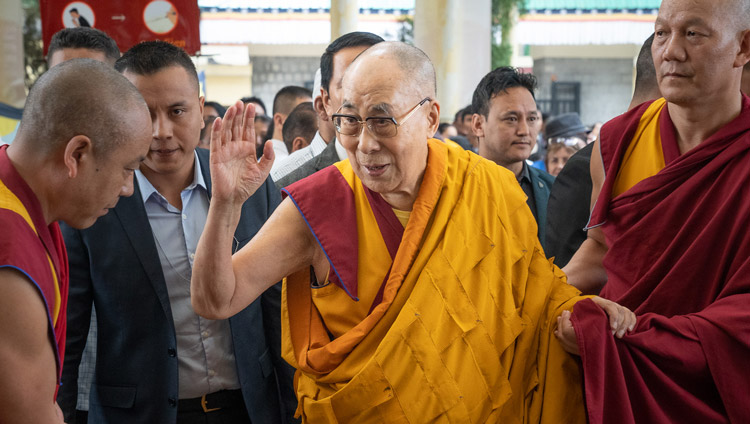
“Today is the final day of this set of teachings,” His Holiness the Dalai Lama observed. “I was thinking that we could hold a ceremony for generating the awakening mind of bodhichitta at the end as an auspicious conclusion. And since the range and content of Nagarjuna’s text is vast and complex, I thought I would teach Tsongkhapa’s ‘Three Principal Aspects of the Path’, which can be readily applied in practice.
“When Atisha came to Tibet he introduced the Kadam tradition that regards the whole content of the Three Collections of Scripture as instructions for practice in terms of persons of three different capacities—small, medium and great. After composing the ‘Great Treatise on the Stages of the Path’, the ‘Medium Treatise’ and the ‘Concise Treatise - the Song of Experience’, Tsongkhapa composed the ‘Three Principal Aspects of the Path’ at the request of Tsako Wönpo, Ngawang Drakpa, a close disciple and leader of the people of Gyalmorong in Eastern Tibet. It’s a useful text to read through every day.”
His Holiness picked up the ‘Commentary on the Awakening Mind’ and began to read from where he left off yesterday with the verse that refers to the twelve links of dependent arising. He noted that in the face of objections that the Middle Way view is nihilistic, Nagarjuna responds that they accept that things exist like dreams and illusions. His Holiness observed that verse 68 shows the conventional and the ultimate to be of the same nature—one does not occur without the other. To see things as independently existent is ignorance. It is a distorted view.
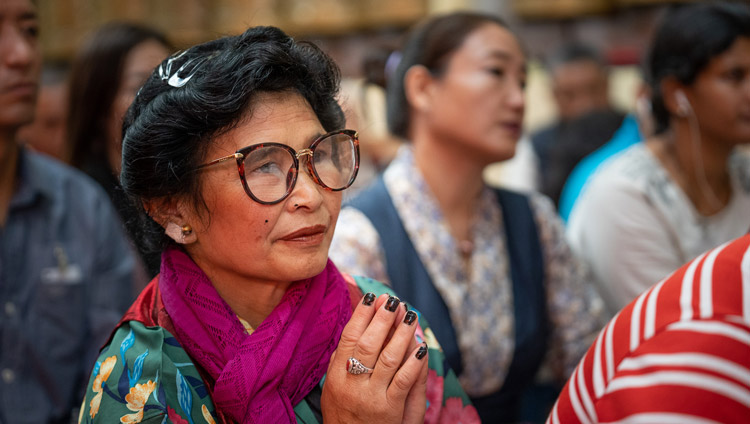
From verse 74 conventional bodhichitta is explained. His Holiness remarked that when you have bodhichitta you have the courage to help others until the end of space. Later, he added that to fulfil our own goals there is nothing better than bodhichitta and to achieve the benefit of others there is nothing better than bodhichitta.
Taking up the 'Three Principal Aspects of the Path', which Tsongkhapa sent to Ngawang Drakpa as a letter, His Holiness mentioned that in an accompanying note Tsongkhapa urged Ngawang Drakpa to practise it well. He assured him that should he do so, when he, Tsongkhapa, manifests enlightenment as one of the 1000 Buddhas of this fortunate aeon, he will share the nectar of his teaching first with him.
“To learn most things,” His Holiness pointed out, “we need a teacher and to learn about the Dharma is the same. In the ‘Great Treatise on the Stages of the Path’, Tsongkhapa comments that you can’t tame others without first becoming tame yourself. We need to follow what the Buddha taught based on the three trainings in ethics, concentration and wisdom. In the ‘Great Treatise’ he recommends scrutinizing the teacher by examining his teaching. Having faith is one thing, but it’s necessary to be more astute, because sometimes teachers make mistakes.
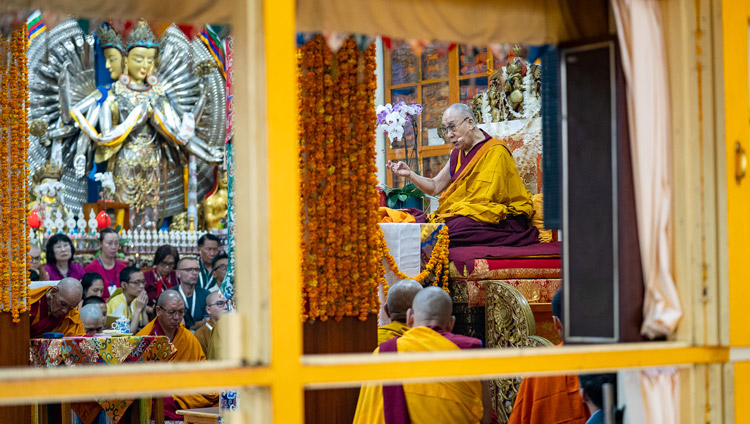
“For example, Kyabjé Phabongka Rinpoché had great disciples like Kyabjé Trijang Rinpoché, but, to be frank, he was mistaken in his propitiation of Gyalpo Shukden. You need to have pure vision with regard to the teacher as a person, but should critically examine what he teaches. I raised objections to the practice of Shukden and later discovered that the Great Fifth Dalai Lama had been very critical of it in his writings. He wrote that Shukden arose as a result of wrong prayers and was born as a negative being that harms beings and the teachings. This is how the Great Fifth, who was himself an accomplished master, who experienced pure visions and so forth, described Shukden.
“I propitiated Shukden too to begin with, but once I’d examined him and his origins I found that it was not appropriate to do such practice. Now, it’s my responsibility to tell people that there is harm, and no benefit, in this practice. By propitiating Shukden people have damaged Tsongkhapa’s tradition.
“We need to think over this idea of viewing everything a teacher does with pure vision. The Buddha didn’t advise us to do that, he encouraged us to examine and investigate even our teachers.
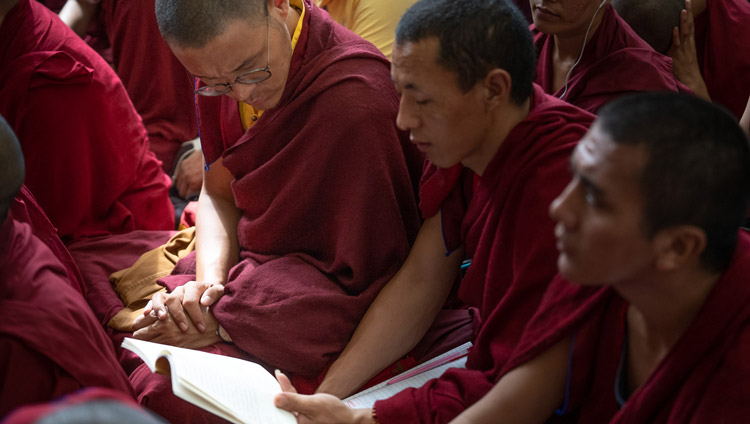
Turning back to Tsongkhapa’s text, His Holiness began to read. “Following the homage to the venerable teachers, Tsongkhapa writes, I will explain the essence of all the teachings of the Conqueror—profound view; the path praised by the Conqueror’s offspring—the awakening mind of bodhichitta, and the entrance for the fortunate who desire liberation—the determination to be free.
“To reach liberation we need to overcome afflictive emotions. We need to study, reflect and meditate on what we learn without merely relying on prayers, faith and rituals. We need to overcome the misconception that is ignorance by following the path that counters it. If we have faith in bodhichitta even for a short time it will be beneficial.
“The text reveals the reasons for the three principal aspects of the path—the determination to be free, bodhichitta and profound view. It explains how to put them into practice and the measure of having done so. It encourages us to appreciate the value of this life, to think about impermanence, the inevitability of death, its unpredictability and the fact that when the time comes only acquaintance with the practice of dharma will be of help.
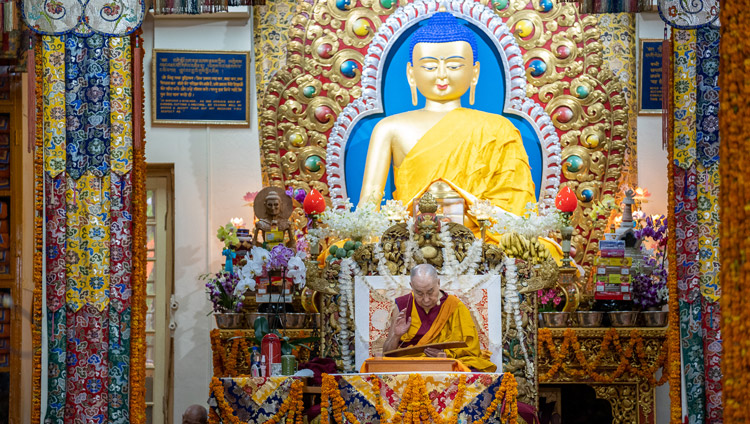
“Verse 5 reveals the measure of having cultivated a determination to be free. Verse 6 deals with reasons to cultivate bodhichitta, while verses 7 and 8 explain how to cultivate it. When I reflect on this text each day, I often adapt these two verses. When applied to self they serve to enhance the determination to be free, when applied to others, they serve to enhance bodhichitta.
“When Khunu Lama Rinpoché taught me the ‘Guide to the Bodhisattva’s Way of Life’, he told me there was no greater text about bodhichitta. However, there are also verses from Nagarjuna’s ‘Precious Garland’ that are inspiring.
May I always be an object of enjoyment
For all sentient beings according to their wish
And without interference, as are the earth,
Water, fire, wind, herbs, and wild forests.
May sentient beings be as dear to me as my own life,
And may they be dearer to me than myself.
May their ill deeds bear fruit for me,
And all my virtues bear fruit for them.
As long as any sentient being
Anywhere has not been liberated,
May I remain [in the world] for the sake of that being
Though I have attained highest enlightenment.
“Verse 9 makes clear that without wisdom, the realization of emptiness, you cannot cut the root of cyclic existence. Following Nagarjuna’s example, Jé Rinpoché advises that it is crucial to strive to understand dependent arising. Dependent arising can be understood in terms of causality, in terms of dependence on parts and in the context of mere designation or conceptual labelling.
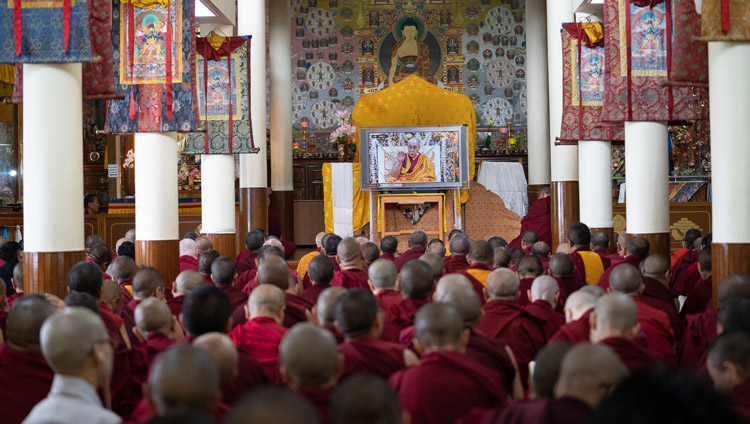
“Dependent implies that the reality of the way things exist is not abandoned, while arising indicates that worldly convention is not relinquished. If you understand cause and effect, you will be able to understand how a whole is dependent on its parts and how things are designated. If you do so, you will have entered the path which pleases the Buddha.
“As long as these two understandings—emptiness and dependent arising---are seen as separate you have not yet realized the intent of the Buddha. In his early life, Tsongkhapa was unable to bring these two together and reconcile how emptiness and dependent arising complement each other. Once he had achieved that insight, he was able to instruct Ngawang Drakpa, ‘When you understand the arising of cause and effect from the viewpoint of emptiness, you are not captivated by either extreme view.’ His concluding advice is—‘Depend on solitude and strong effort, and quickly reach the final goal’.
His Holiness led the assembly through the ceremony for generating the awakening mind of bodhichitta. At the end he gave the transmission of the mantras of the Buddha, Avalokiteshvara, Manjushri and Arya Tara.
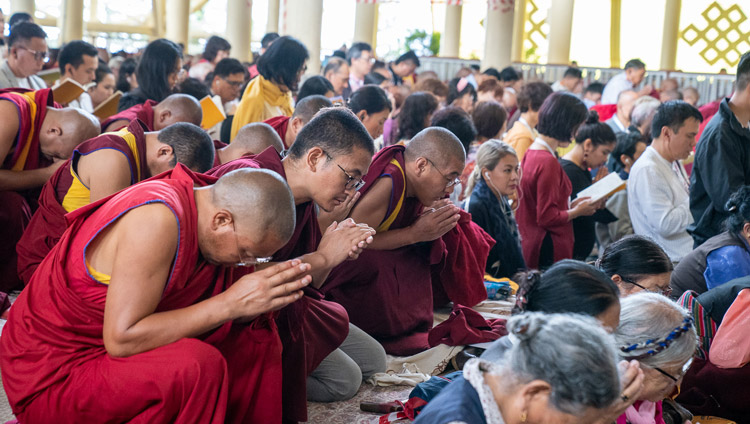
“With that we’re done,” he announced. “The teaching is complete. I’m looking forward to next year.” The audience applauded.
Members of the 38 groups of Asians, who were the primary disciples of this series of teachings, gathered around the throne to have their photographs taken with His Holiness. He was then escorted from the temple to where his car was parked at the foot of the temple stairs. Smiling and waving to people who had waited in the yard to see him, he drove back to his residence.












